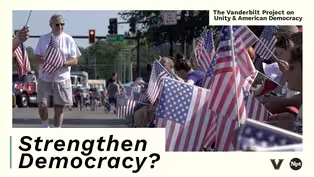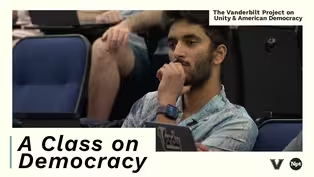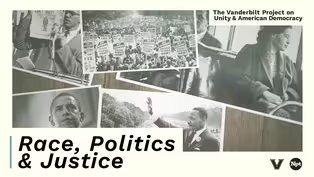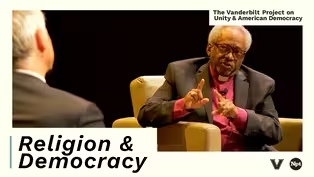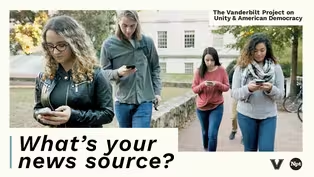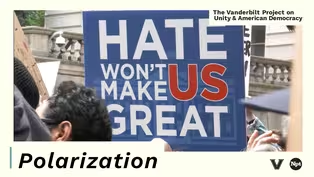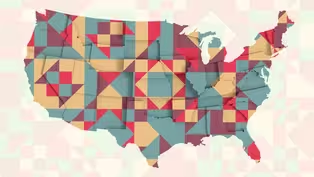
Polarization
Clip | 10m 30sVideo has Closed Captions
The Vanderbilt Unity Project explores polarization in politics and its root causes.
American democracy is struggling with deep polarization. Partisan warfare has supplanted evidence-based problem-solving, and the endless ideological conflict is overwhelming the work of politics. The Vanderbilt Project on Unity & American Democracy explores the issue of polarization and seeks to understand the root causes.
Problems playing video? | Closed Captioning Feedback
Problems playing video? | Closed Captioning Feedback
The Vanderbilt Project on Unity & American Democracy is a local public television program presented by WNPT

Polarization
Clip | 10m 30sVideo has Closed Captions
American democracy is struggling with deep polarization. Partisan warfare has supplanted evidence-based problem-solving, and the endless ideological conflict is overwhelming the work of politics. The Vanderbilt Project on Unity & American Democracy explores the issue of polarization and seeks to understand the root causes.
Problems playing video? | Closed Captioning Feedback
How to Watch The Vanderbilt Project on Unity & American Democracy
The Vanderbilt Project on Unity & American Democracy is available to stream on pbs.org and the free PBS App, available on iPhone, Apple TV, Android TV, Android smartphones, Amazon Fire TV, Amazon Fire Tablet, Roku, Samsung Smart TV, and Vizio.
- The story begins in November of 2020.
(suspenseful music) - We were getting ready to win this election.
Frankly, we did win this election.
(audience cheers and applauds) All of a sudden, oh, we have some mail-in ballots.
It's amazing how those mail-in ballots are so one-sided.
- Make America great again!
- Democracy doesn't work if the other side is always wrong.
- This election count is still in process.
This is a race where every single- - [Reporter] Every single vote counts.
- [Reporter] All the votes have to be counted.
- [Reporter] Joe Biden has been declared the next president of the United States.
- [Crowd] Stop the steal, stop the steal!
- If you choose ideology as your determination of what you're gonna do for policy and for government, you're gonna be wrong half the time.
'Cause no one ideology has all the answers, it just doesn't.
(protesters shouting) - Things don't feel like they're working really well in the Democratic process.
We're just constantly at each other's throats.
- Clearly illegal, clearly voter fraud, easily provable.
Hundreds of witnesses, maybe thousands.
- There's a lot of moving parts to this, but we have not seen any evidence of 13,000 illegal votes cast.
- [Reporter] Hundreds of people have gathered on the steps of the Capitol trying to get into the Capitol Building.
They believe the election was stolen and it was rigged.
- The law matters.
I took an oath under God.
Under God!
(glass shattering) - [Reporter] Protestors have now broken into the US Capitol.
Just one police officer trying to stop a crowd of dozens.
It looks like protestors are entering the Capitol at will.
- It's what do you do when you're polarized?
How do you handle your differences?
Are you handling your differences amicably, civilly?
Or are you turning towards hate and violence?
- [Narrator] American democracy is struggling with deep polarization.
Partisan warfare has supplanted evidence-based problem solving and the endless ideological conflict is overwhelming the work of politics, which, by the way, happens to be the mediation of differences.
- We are living in a world where a mob stormed the United States Capitol.
Never happened before, not even during the Civil War.
And so you have to sit back and think, why did that happen?
And how do we keep it from happening again?
What could we do at Vanderbilt that would shed light in this moment where all people tend to do is generate heat?
There will always be polarization.
What we have to find a way to do, and the point of this project in many ways, is to take some of the oxygen away from the fires of reflexive polarization.
- Yes, yeah, it's a good one.
- Yes, - Yes.
- Yes.
- Yes.
- Yes.
- Yes.
(chuckles) - Yes.
- Yes.
- Yep.
- It's become that the other side is the enemy.
The other side's not the enemy.
The problem is the enemy, you know, poverty's the enemy, climate issues are the enemy, building longterm debt in this country is the enemy.
That's the enemy.
Now, the fact that you might have a different idea of how to solve that doesn't make you my enemy.
- And when we're talking about unity right out of the gate, we're not talking about agreeing on policy.
We expect policy disagreements, that's what democracies are about.
What we were talking about was unity of believing in the rules of the game, rule of law, the Constitution, and those kinds of things.
- You really have to have these amendments, principles, and norms in place that everybody believes in and is subscribing to in order to have a functional democracy.
- [Narrator] With those democratic principles in mind, The Vanderbilt Project on Unity and American Democracy was established, managed by John Geer and Co-chaired by Jon Meacham, Samar Ali, and former Tennessee governor Bill Haslam.
The project is a non-partisan hub for scholars, policy makers, activists, leaders, and others to discuss and develop evidence-based solutions that are not driven by ideological bias.
- We should all take a moment and take a step back.
- The work we're trying to do here is in a respectful, thoughtful, reflective, super partisan way to discuss the internal and perennial principles that need to be protected.
- More and more people think that the other side is not only wrong, but they're wrong for bad motives.
- I think that this is what's concerning for a lot of us.
And we're wondering, are we moving into an authorizing environment for cruelty?
For violence, for brutality?
That's concerning, that's not good for democracy, that's not good in a democracy.
So we're doubling down on our efforts here to see how we disrupt cycles that lead to violence and we move towards cycles that lead to unity, that lead to peace, that lead to civility.
- [Narrator] The project produces research publications, panel discussions, animated videos, unity dinners, a unity index, a course at Vanderbilt University and more, all with the goal of introducing evidence back into the national conversation and encouraging citizens to use fact-based reasoning.
- Good morning, everyone, and welcome to this event here at Vanderbilt.
I'm really delighted about the conversation we're gonna have today.
- So every program we do, we want to get people to understand that whether you're on the left side or the right side of the spectrum, the more important thing is to have evidence and to try to adjudicate that in a way that tells you what's the best policy.
Because if you choose ideology as you're determination of what you're gonna do for policy and for government, you're gonna be wrong half the time.
'Cause no one ideology has all the answers, it just doesn't.
Evidence isn't gonna get you to a 100%, but it's gonna get you a lot closer to better answers and more frequently good answers than if you just rely on ideology.
And so each and every program is tied with that notion of mind.
- There are parts of the pluribus that see themselves as in possession, exclusive possession of the truth.
Opinions aren't evidence.
Evidence is the considered result of both experience and reason.
To argue from facts as opposed to an ideological predisposition was an essential insight.
- So one of the things that I think matters is just giving people better information.
- If we can give people a fair and a balanced account of information, we can remind people that we need this evidence that's not ideologically driven.
I think that, you know, that fills an important need.
It teaches how to have civil discourse to realize that the person on the other side of the fence, so to speak, might just be right and listen to that person.
And at least at minimum, you learn from that prospect.
- The fact that people are actually having that discussion, we should reflect on that to say, "Maybe we need to reevaluate what we're doing here."
It's an ability to say, "I might be wrong."
I might be wrong is in some ways a threshold question for political unity.
So this comes back to all of us, right?
We have to support people who are willing to compromise.
And you just have to make clear that you don't have to give up your political life if you compromise.
- My political mentor was Senator Howard Baker, he was a senator from Tennessee, and he had a saying, "Always remember the other person might be right."
And that's a good place to start our conversations.
But that doesn't mean we're not supposed to have a point of view.
I'm a Republican, I can give you lots of reasons why, you know, I think that perspective is the right one.
But I get in trouble if I always think that I'm right and the other side's wrong, because that's just not true.
It's not true anywhere else in my life, why would it be true in my politics?
- On an individual level, if someone disagrees with me and they're telling me I'm wrong, I have to be able to weigh whether or not that's true.
I could be, and I don't know anybody who enjoys being told they're wrong.
So I don't wanna hear it, I don't wanna be told that I could be wrong.
But the personal takeaway here is an openness to think, okay, maybe you have a point.
And that's the nature of American democracy.
It requires an enormous amount of work.
And part of that work is understanding that you have to say something if the evidence leads you bad about the good guys or good about the bad guys.
The key thing is do we agree on principles that enable us to not have to win every afternoon?
Video has Closed Captions
Clip | 8m 10s | How Vanderbilt's Unity Project promotes unity, inclusivity, and active civic engagement. (8m 10s)
Clip | 8m 29s | A Vanderbilt course helping students understand how democracies do and do not work. (8m 29s)
Clip | 9m 26s | The profound influence and historical and contemporary impact of race on politics. (9m 26s)
Clip | 9m 57s | The relationship between religion and politics and how it shapes democracy. (9m 57s)
Clip | 8m 33s | The Vanderbilt Unity Project explores how information and disinformation affect politics. (8m 33s)
Video has Closed Captions
Clip | 10m 30s | The Vanderbilt Unity Project explores polarization in politics and its root causes. (10m 30s)
The Vanderbilt Project on Unity & American Democracy Trailer
Video has Closed Captions
Preview | 30s | The Vanderbilt Project on Unity & American Democracy seeks to supplant ideology with fact. (30s)
Providing Support for PBS.org
Learn Moreabout PBS online sponsorship
- News and Public Affairs

Top journalists deliver compelling original analysis of the hour's headlines.

- News and Public Affairs

FRONTLINE is investigative journalism that questions, explains and changes our world.












Support for PBS provided by:
The Vanderbilt Project on Unity & American Democracy is a local public television program presented by WNPT
